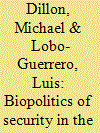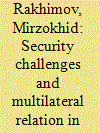| Srl | Item |
| 1 |
ID:
086147


|
|
|
|
|
| Publication |
2008.
|
| Summary/Abstract |
This essay addresses two questions. It first asks what happens to security practices when they take species life as their referent object. It then asks what happens to security practices which take species life as their referent object when the very understanding of species life undergoes transformation and change. In the process of addressing these two questions the essay provides an exegesis of Michel Foucault's analytic of biopolitics as a dispositif de sécurité and contrasts this account of security with that given by traditional geopolitical security discourses. The essay also theorises beyond Foucault when it interrogates the impact in the twentieth century of the compression of morbidity on populations and the molecular revolution on what we now understand life to be. It concludes that 'population', which was the empirical referent of early biopolitics, is being superseded by 'heterogenesis'. This serves as the empirical referent for the recombinant biopolitics of security in the molecular age.
|
|
|
|
|
|
|
|
|
|
|
|
|
|
|
|
| 2 |
ID:
092329


|
|
|
|
|
| Publication |
2009.
|
| Summary/Abstract |
Through an analysis of a speech held by Finnish Minister of Defence Jyri Hkmies at CSIS in Washington in 2007, the article scrutinizes the new emergence of "geopolitics" in international politics. Although its novelty is debatable, in this new geopolitical discourse the main focus is not related to the spatial borders of a nation state but instead to securing territory beyond these borders. It seems that "common values", basically undefined but allegedly including such ideas like democracy, are related to this new form of "geopolitics". In contrast to traditional geopolitics and identity politics, the global or cosmopolitical "us" defending common values seems to be a changing coalition and other countries appear only as objects of its operations. Only Russia, waking from its decade-long hibernation, emerges as a potential challenge to "us". Curiously enough, its awakening also brings geopolitics back. The analysis of the speech reveals that the "new situation" requires choosing friends and enemies that are not clearly defined in the classical geopolitical sense. Even in the traditional sense of protecting the borders etc., the geopolitical security of Finland is best protected through acting for the geopolitical security of the whole world, no matter where or when that might require our presence. But from where does, for instance, the legitimacy of the operations of "us" derive? In the speech of minister Hkmies, many of the classical themes of political theory reappear, though in a new form. It is guided by geopolitical concerns, but the geopolitics it entails is rather different from the traditional way of thinking about it. This also creates a need to rethink some central concerns of political theory.
|
|
|
|
|
|
|
|
|
|
|
|
|
|
|
|
| 3 |
ID:
129410


|
|
|
|
|
| Publication |
2014.
|
| Summary/Abstract |
New geopolitics and security Central Asia faced considerable political, social, and cultural changes throughout the whole of the 20th century; since the beginning of the 21st century, the region is confronted to new steps of the geopolitical transformation. Some experts say that Central Asia is returning to the Great Game of the 19th century but with new players. It is well-known that Central Asia historically was in the center or important aspects of interest of different empires and one could say that the region was more or less in Great Game situation during all periods of its history. After the collapse of the Soviet Union, the newly Independent Central Asian republics tried to form new bilateral and multilateral relations and within a short time the Central Asian nations were formally recognized by many countries, which established with most of them diplomatic ties and exchanged diplomatic missions. The region's countries have joined the main international and regional organizations.
|
|
|
|
|
|
|
|
|
|
|
|
|
|
|
|